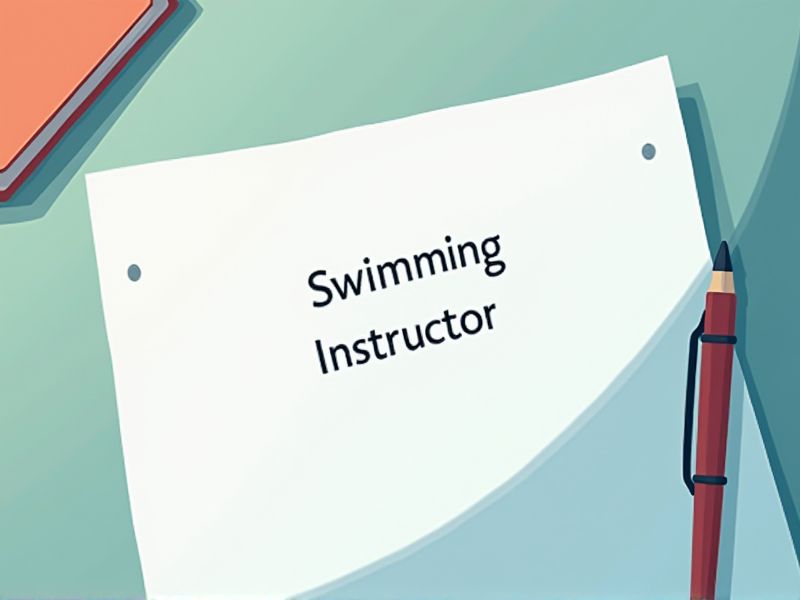
Swimming instructors require specific certifications to ensure they possess the necessary skills and knowledge to teach effectively and safely. These certifications validate an instructor's competence in various areas, including lifesaving techniques, water safety protocols, and swim instruction methods. Without proper certification, instructors may lack the ability to handle emergencies or manage diverse learning needs confidently. Here are some crucial certifications typically needed for a swimming instructor.
American Red Cross Swimming Instructor Certification
The American Red Cross Swimming Instructor Certification ensures that instructors possess the essential skills and knowledge to teach varying levels of swimmers safely and effectively. This certification demonstrates that the instructor is trained in the latest water safety techniques and teaching methodologies, enhancing their credibility. It provides standardization, aligning instructors with widely recognized safety and teaching protocols. Certified instructors tend to gain trust more easily from employers and clients, potentially leading to better career opportunities in aquatic settings.
American Red Cross Lifeguard Certification
Having the American Red Cross Lifeguard Certification signifies proficiency in essential rescue skills which ensures the safety of swimming students. In emergencies, certified instructors can effectively manage and respond, reducing the risk of accidents. Many facilities mandate this certification to meet safety and liability standards. This certification enhances the instructor's credibility and employability in aquatic facilities.
American Red Cross CPR/AED Certification
Having an American Red Cross CPR/AED certification equips a swimming instructor with crucial lifesaving skills, enhancing their ability to respond to emergencies. Access to this certification ensures that instructors can effectively administer CPR and use an AED, which can increase survival rates during cardiac events. Regulatory bodies often require this certification as a standard to ensure the safety of swimming participants. Additionally, possessing this certification boosts an instructor's professional credibility, making them more reliable and trustworthy to both employers and students.
American Red Cross First Aid Certification
Being certified in American Red Cross First Aid enables swimming instructors to respond effectively to emergencies, enhancing the safety of their classes. Proficiency in first aid and response techniques builds trust with participants and their families, knowing the instructor is prepared for potential accidents. The certification equips instructors with essential skills to manage injuries like cuts, sprains, and more critical incidents such as drowning. Many organizations require such credentials for legal and insurance purposes, ensuring instructors meet safety standards and compliance.
YMCA Swim Instructor Certification
Obtaining a YMCA Swim Instructor Certification ensures that instructors possess standardized teaching and safety skills crucial for effective swim lessons. With this certification, instructors are trained in various swimming techniques and emergency response procedures, which reduce the risk of accidents during lessons. It builds trust with parents and participants, knowing that the instructor has received comprehensive, verified training. The certification often aligns with industry standards, making it easier for instructors to find employment across different aquatics facilities.
International Lifeguard Training Certification
The International Lifeguard Training Certification ensures a standardized skill set among swimming instructors, enhancing their ability to effectively manage emergencies. It also boosts credibility and trust among clients and employers, as certified instructors are recognized for their professional competence. Knowledge of advanced rescue techniques, CPR, and first aid embedded in this certification enhances safety outcomes at swimming facilities. Moreover, it keeps instructors updated with the latest international safety protocols and best practices.
Water Safety Instructor Certification
Water Safety Instructor Certification ensures a swimming instructor has the necessary skills to teach water safety and swimming effectively. With this certification, instructors are trained in emergency response techniques to handle potential drowning or injury situations. The program emphasizes the importance of safe teaching practices, reducing the risk of accidents during lessons. Certified instructors are generally more trusted by parents, increasing their employability and reputation within aquatic centers.
American Heart Association Heartsaver CPR/AED Certification
Swimming instructors are often among the first responders in aquatic emergencies, and having Heartsaver CPR/AED certification from the American Heart Association equips them with essential life-saving skills. If a swimmer experiences cardiac arrest, immediate intervention with CPR and an AED can significantly increase their chances of survival. The certification ensures instructors are prepared to handle emergencies, thereby enhancing the safety of swimming environments. Recognizing the credibility of the American Heart Association underscores the importance of standardized, effective first aid training.
Basic Life Support (BLS) Certification
BLS certification equips swimming instructors with essential skills to respond effectively during water-related emergencies, increasing safety for participants. Drowning incidents require prompt intervention, and BLS-trained instructors can administer CPR, significantly enhancing survival rates. Many aquatic facilities mandate BLS certification, meeting both industry standards and legal requirements. Knowledge in handling emergencies reassures parents and guardians, fostering trust and encouraging more enrollments in swimming programs.
Emergency First Response Certification
Emergency First Response Certification equips swimming instructors with crucial lifesaving skills, enhancing their ability to respond effectively to emergencies in aquatic environments. Liability concerns in swimming facilities often necessitate certification to ensure instructors are prepared for any potential incidents, maintaining a safe environment. This certification fosters trust among participants and their families, as it indicates a commitment to safety and professional standards. Regulations and industry standards frequently require such certifications to meet compliance, reinforcing the importance of trained personnel in reducing risks.
Summary
With new certifications, you can enhance your credibility as a swimming instructor, attracting more students. The added qualifications often boost client trust, leading to increased enrollment and retention rates. Your skills in teaching complex techniques improve, resulting in higher student performance. Consequently, you might experience professional growth opportunities, such as higher pay or advanced roles.
